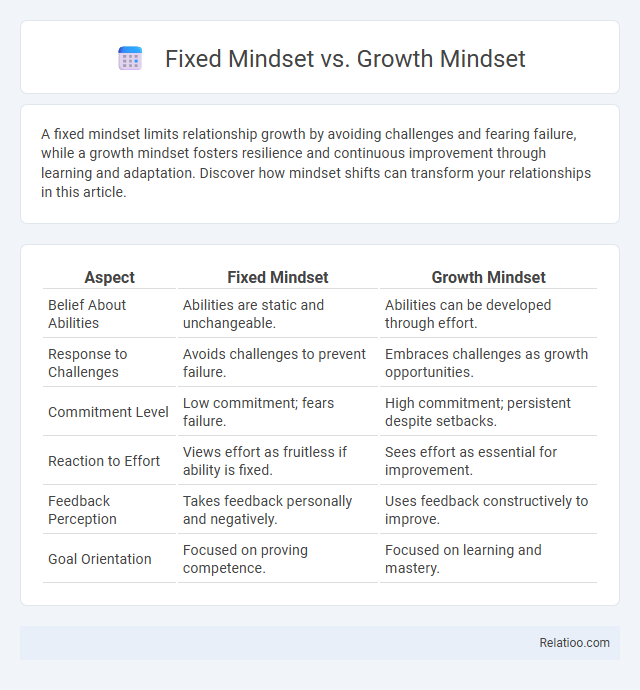A fixed mindset limits relationship growth by avoiding challenges and fearing failure, while a growth mindset fosters resilience and continuous improvement through learning and adaptation. Discover how mindset shifts can transform your relationships in this article.
Table of Comparison
| Aspect | Fixed Mindset | Growth Mindset |
|---|---|---|
| Belief About Abilities | Abilities are static and unchangeable. | Abilities can be developed through effort. |
| Response to Challenges | Avoids challenges to prevent failure. | Embraces challenges as growth opportunities. |
| Commitment Level | Low commitment; fears failure. | High commitment; persistent despite setbacks. |
| Reaction to Effort | Views effort as fruitless if ability is fixed. | Sees effort as essential for improvement. |
| Feedback Perception | Takes feedback personally and negatively. | Uses feedback constructively to improve. |
| Goal Orientation | Focused on proving competence. | Focused on learning and mastery. |
Understanding Fixed and Growth Mindsets
Fixed mindset individuals believe their abilities and intelligence are static and unchangeable, often avoiding challenges to prevent failure. Growth mindset embraces the idea that skills and intelligence can be developed through effort, learning, and persistence, leading to increased motivation and resilience. Understanding these mindsets is crucial for fostering personal development, as adopting a growth mindset encourages continuous improvement and adaptability in various aspects of life.
The Origins of Mindset Theory
Carol Dweck, a renowned psychologist, pioneered the mindset theory through decades of research on motivation and personality. Her studies revealed that individuals with a fixed mindset believe abilities are innate and unchangeable, while those with a growth mindset view intelligence and talents as developable through effort and learning. Understanding these concepts empowers you to cultivate a growth mindset, fostering resilience and continuous personal development.
Key Characteristics of a Fixed Mindset
A fixed mindset is characterized by the belief that intelligence and abilities are static traits that cannot be changed or developed over time. Individuals with this mindset often avoid challenges, give up easily when faced with obstacles, and view effort as fruitless or indicative of a lack of talent. This mindset leads to a focus on proving oneself rather than improving, hindering personal growth and resilience.
Defining Traits of a Growth Mindset
A growth mindset is characterized by embracing challenges, persisting through obstacles, and valuing effort as a path to mastery. You believe intelligence and abilities can be developed through dedication, learning, and resilience. This mindset fosters continuous improvement, adaptability, and a proactive approach to personal and professional growth.
Impact on Learning and Intelligence
A fixed mindset assumes intelligence is static, limiting your ability to embrace challenges and hindering learning growth. In contrast, a growth mindset views intelligence as malleable, encouraging perseverance and adaptive learning strategies that enhance cognitive development. Emphasizing growth fosters resilience and continuous improvement, significantly improving educational outcomes and long-term intelligence.
Effects on Career Development
A fixed mindset limits your career growth by causing you to avoid challenges and view failures as setbacks, ultimately restricting skill development and advancement. In contrast, a growth mindset encourages embracing challenges and learning from mistakes, leading to continuous improvement and increased opportunities for promotion. Fostering this growth mindset accelerates career development by enhancing adaptability, creativity, and resilience in the face of workplace changes.
Mindsets and Personal Relationships
A fixed mindset limits your ability to improve in personal relationships by causing resistance to feedback and fear of change, while a growth mindset encourages learning from challenges and fosters empathy and communication skills. Embracing a growth mindset promotes healthier connections by allowing you to adapt, understand others' perspectives, and build trust over time. Fostering a growth mindset directly enhances emotional intelligence and resilience, key factors for sustaining meaningful, long-term relationships.
Common Myths About Mindsets
Common myths about mindsets suggest that a fixed mindset is entirely negative and a growth mindset guarantees success, which oversimplifies the complexities of personal development. Fixed mindsets can provide stability and focus in certain situations, while growth mindsets require effort and resilience that may not always lead to immediate improvement. Understanding these nuances helps individuals apply mindset concepts more effectively in educational and professional settings.
Strategies to Shift from Fixed to Growth Mindset
Shifting from a fixed mindset to a growth mindset involves embracing challenges as opportunities for learning and viewing failures as valuable feedback rather than setbacks. You can cultivate this shift by intentionally practicing self-reflection, seeking constructive criticism, and setting incremental goals that promote continuous improvement. Strategies like adopting a growth-oriented vocabulary, celebrating effort over innate talent, and surrounding yourself with growth-minded individuals significantly enhance the transition and support sustained personal development.
Cultivating a Growth Mindset in Daily Life
Cultivating a growth mindset in daily life enhances your ability to embrace challenges, learn from failures, and persist through setbacks, transforming obstacles into opportunities for development. Unlike a fixed mindset that views abilities as static, a growth mindset encourages continuous improvement by valuing effort, strategies, and feedback. Practical strategies for nurturing this mindset include setting specific learning goals, reflecting on progress, and seeking out constructive criticism to fuel personal and professional growth.

Infographic: Fixed Mindset vs Growth Mindset
 relatioo.com
relatioo.com